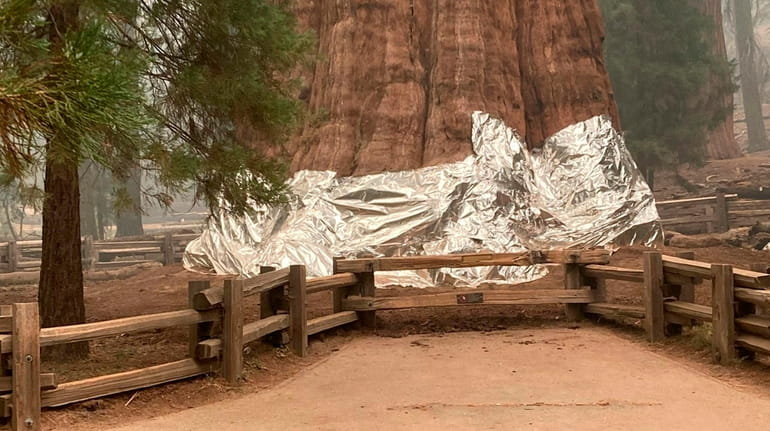The awful price of inconsistency

Aluminum foil wrapped around the base of the giant sequoia known as the General Sherman Tree in a fire-resistant blanket to protect it from the intense heat of approaching wildfires at Sequoia National Forest in California. Credit: AP
So it's come to this: Aluminum foil wrapped around tree trunks.
Not just any tree trunks; these were majestic giant sequoias in California. And not just any foil; these were huge aluminum-based blankets used to protect houses — and now trees — from flames.
The sequoias have been in the path of two of California's devastating wildfires. They are among the largest and oldest living things on the planet. Some are more than 3,000 years old, a staggering figure, and they soar more than 200 feet. Walking among them reduces one to silence. Gazing begets reverence.
Native Americans call them the Ancient Ones. People have prayed for their survival, and wept at their demise.
It's no wonder the urge to preserve them was so strong.
But this battle to save the sequoias — largely successful so far — has become another bracing data point among so many charting the toll on Earth of a warming climate.
The war against climate change — waged unevenly both within and among countries — was bolstered a bit by two pieces of news last week. President Joe Biden pledged to double the nation's commitment to $11.4 billion to a fund that helps developing nations deal with climate change. And Chinese President Xi Jingping said his nation, by far the world's largest supporter of coal-fired power plants, would no longer finance such construction overseas.
Nice steps, but caveats must be noted. Biden needs approval from a divided Congress, and Xi presented no timetable and said nothing about the building of coal-powered plants in his own country, a huge source of greenhouse gases.
The moves by the world's top two emitters were meant to be adrenaline shots for the next UN climate change conference in Scotland on Nov. 1-2. The gathering is awash in doubt over the world's ability to meet the target of the Paris agreement to hold warming to 1.5 degrees Celsius above preindustrial levels. After all, a recent UN report that analyzed climate change commitments by all nations to date found that temperatures still would rise a catastrophic 2.7 degrees Celsius by the end of the century. The moves by Biden and Xi, if they come to fruition, would move the needle a tad.
Inconsistencies abound.
West Virginia Democratic Sen. Joe Manchin, founder of coal companies who has profited mightily from those investments, will shape the climate change legislation in his party's $3.5 trillion budget bill as chair of the Senate's energy committee. He says eliminating fossil fuels won't "clean up the global climate" but will make it worse. But he supports planting trees to suck some carbon from the air. Thank goodness.
Elsewhere, the head of the Social Democratic Party leading in polling in Sunday's German elections proposes to combat global warming by setting a national speed limit — of 81 mph. Many nations' commitments to achieve net-zero emissions don't call for any actual reductions in emissions, only so-called offsets.
Meanwhile, the Southwest is in an epic 22-year drought, the last year of which was the worst on record. Arizona, Nevada and New Mexico face cuts in water allocations from the Colorado River, which supplies 40 million people. The Atlantic Ocean keeps spawning tropical storms — like Ida, by no means a monster when it reached the Northeast but strong enough to kill dozens and stun the region with its destructive flooding. And fires continue to burn all over.
If we keep dithering, we're going to need a lot more foil.
Columnist Michael Dobie's opinions are his own.

